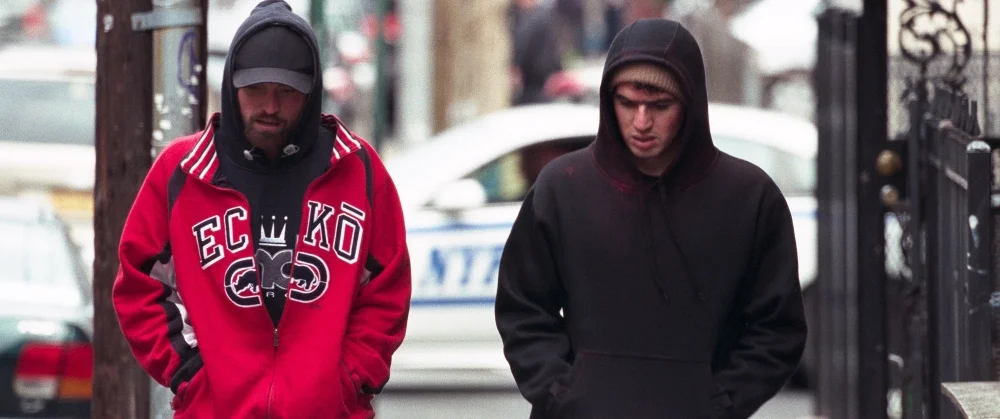Movie Review: “Good Time,” with Robert Pattinson, Benny Safdie, Jennifer Jason Leigh, Taliah Webster, and Barkhad Abdi
Robert Pattinson is a riveting actor, no matter what you think of his sparkly vampire days, and the filmmaker Safdie brothers, Benny and Josh, sure as hell know how to pair thrilling chase scenes with a pulsating, jarring score. But those are noteworthy elements that don’t outweigh the far more plentiful, far more problematic parts of Good Time, which is honestly pretty damn unpleasant to watch.
The protagonist is a privileged abuser; the narrative is needlessly drawn out; and the most interesting elements of the film are the most ignored. Good Time will undoubtedly show up on a lot of critics’ best-of-2017 lists (and is getting raves from places like The New Yorker, whose Richard Brody called it “transcendent” and gave it the headline “an Instant-Classic Crime Drama for the Age of Trump”) but I couldn’t disagree more.
Good Time focuses on the Nikas brothers, Connie (Pattinson, of The Twilight Saga: Breaking Dawn–Part 2) and Nick (Benny Safdie, acting as well as co-directing with brother Josh, who wrote the film). The former is a slick talker, full of schemes to go along with a guileless face that is often trying to sell the stupidest of plans; the latter seems to be developmentally disabled and hearing impaired. We meet them in a scene that immediately sets up both characters: In a therapist’s office, Nick doesn’t understand the questions being asked of him, answering slowly and lethargically, but bristles when the man takes notes on his answers; Connie, who bursts in and drags Nick away, refuses to believe the therapist’s insistence that Nick needs help and shouldn’t go with his brother.
Nick’s naivete and Connie’s defensiveness are a bad combination—underlined when the film reveals that Connie previously assaulted their guardian (“Fuck Grandma,” he blithely says)—but Connie swears that he is committed to Nick: “It’s just you and me. I’m your friend,” he insists. But does a friend convince the other to participate in a bank heist (while wearing hyper-detailed masks that make them look like black men)? Or leave him behind when the cops are chasing them? After Nick is arrested, it becomes Connie’s mission to somehow come up with the thousands of dollars to bail him out—but because he is ultimately short-sighted and selfish, the night veers more and more off track.
It seems simple at first: use the money they stole to get Nick out of Rikers Island. But a huge amount of it is ruined by an exploded dye pack, and the fence Connie is using refuses to process it, leaving him about $10,000 short. The addict (an underused Jennifer Jason Leigh) who is infatuated with Connie whom he hits up for money is no help; her mother has cut off her credit cards. And then there’s a mid-film twist that seems to entirely ruin Connie’s plan to save Nick—but he perseveres anyway, corrupting and harming more and more people in his night of brazen disregard for anyone who isn’t him.
There is only one way to read Connie’s Queens quest: that it’s his unchecked white privilege that causes him to literally hurt every person of color he comes across in the film. Good Time is undoubtedly about that, because the pattern that comes up for all of Nick’s victims is the color of their skin: the teenage girl (Taliah Webster) he seduces into helping him is black; the security guard he assaults (Barkhad Abdi, of Captain Phillips) is black; the strangers whom he politely asks for favors, always expecting that they’ll help, are all black. That’s white privilege all right, but is the film criticizing it? Like, at all? Because how often the film uses Connie’s concern for Nick as an excuse for his awful behavior doesn’t seem like an indoctrination for his actions, but a sentimental explanation for them.
This reading is buoyed by the fact that whenever the film cuts to Nick in Rikers Island, he’s doing something else that shows how utterly noncomprehending of and unprepared he is for this experience—like changing the television channel and bringing on a beatdown, also by men who by far happen to be black. “Look at how much trouble Nick is in,” the film seems to be saying. “The only thing Connie can do now is save him!” How often the Safdie brothers lean on that perception of Connie’s character makes it seem like we’re supposed to sympathize with him, we’re supposed to be emotionally invested in his relationship with Nick, we’re supposed to root for him even as he does increasingly reckless things. But that’s white privilege in action yet again, and it’s nearly impossible to separate that problematic element of Good Time from any other understanding of it.
What the film needed, if that’s how the Safdie brothers wanted to position Connie and Nick in relation to us as viewers, was more scenes of the two actually spending time together. What are their days like? Where do they live? Were they close throughout childhood? Good Time wants to be a gritty crime movie, and it stays in that lane to the detriment of building a foundation for its characters. Pattinson is phenomenal, burrowing deeply into Connie’s single-mindedness, but that’s not enough. Good Time ends with the idea that “You choose your truth,” but that feels hypocritical for a movie that is rigidly, blindly unaware of the characters and the reality it is actually presenting.







